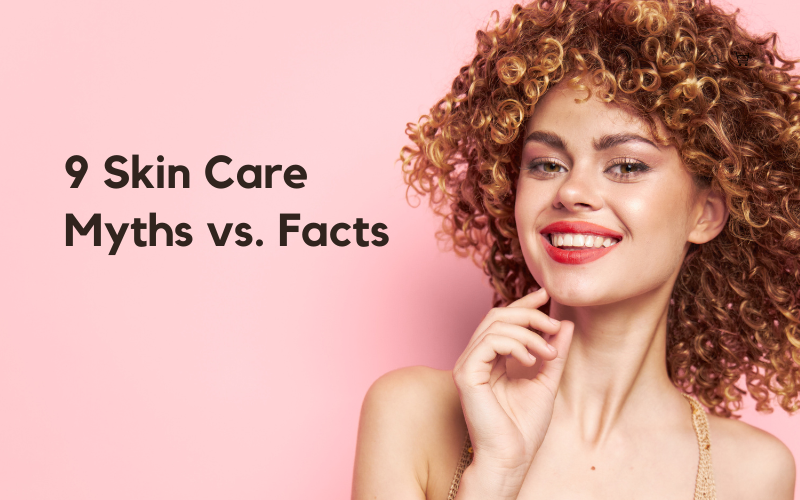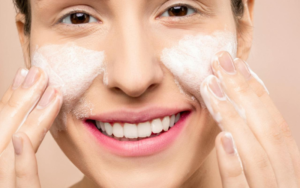The world of skin care is filled with myths and misconceptions that can lead to confusion and ineffective routines. Understanding the facts behind these myths is essential for maintaining healthy, glowing skin. This section will debunk common skin care myths and provide factual information to help you make informed decisions about your skin care routine. Let’s explore these myths and set the record straight.
Myth 1: You Only Need Sunscreen on Sunny Days
Fact: Sunscreen is essential every day, regardless of the weather. UV rays can penetrate clouds and even glass, causing skin damage and increasing the risk of skin cancer.
UVB rays cause sunburn, while UVA rays penetrate deeper into the skin, leading to premature aging and skin cancer. Both types of rays can harm your skin even on cloudy or rainy days.
Tip: Apply a broad-spectrum sunscreen with at least SPF 30 every morning as part of your skin care routine.
Myth 2: Oily Skin Doesn’t Need Moisturizer
Fact: All skin types, including oily skin, need moisturizer. Skipping moisturizer can lead to increased oil production and breakouts.
Moisturizers help to balance the skin’s oil production. Using a lightweight, non-comedogenic moisturizer can keep oily skin hydrated without clogging pores.
Tip: Choose a gel-based or oil-free moisturizer to hydrate oily skin without adding extra oil.
Myth 3: Expensive Products Are Always Better
Fact: Price does not always equate to quality. Many affordable skin care products are effective and contain similar active ingredients as their expensive counterparts.
The effectiveness of a skin care product depends on its ingredients and formulation, not its price. Researching and understanding ingredients can help you find high-quality products at any price point.
Tip: Look for key ingredients like hyaluronic acid, retinoids, and antioxidants when choosing products.
Myth 4: Natural Ingredients Are Always Safe and Better for Your Skin
Fact: Natural ingredients are not inherently safer or more effective than synthetic ones. Some natural ingredients can cause irritation or allergic reactions.
Both natural and synthetic ingredients can benefit the skin, but it’s essential to consider your skin type and sensitivities. Not all natural ingredients are gentle, and some synthetic ingredients are highly effective and safe.
Tip: Patch test new products, whether natural or synthetic, to ensure they don’t irritate your skin.
Myth 5: You Can Shrink Your Pores
Fact: Pore size is largely determined by genetics and cannot be permanently changed. However, you can minimize their appearance.
Pores can appear larger due to factors like clogged pores, excess oil, and aging. Using products that exfoliate and control oil can help reduce their visibility.
Tip: Use products with salicylic acid, retinoids, or niacinamide to keep pores clean and less noticeable.
Myth 6: You Only Need to Worry About Wrinkles When You’re Older
Fact: Preventive care is essential for maintaining youthful skin. Starting an anti-aging routine in your 20s or 30s can help delay the appearance of wrinkles.
Factors like sun exposure, pollution, and lifestyle choices contribute to premature aging. Using sunscreen, antioxidants, and retinoids early can protect your skin and maintain its youthful appearance.
Tip: Incorporate anti-aging products like retinoids and Vitamin C into your routine early on.
Myth 7: Scrubbing Your Face Harder Will Cleanse It Better
Fact: Over-scrubbing can damage your skin’s barrier, leading to irritation and breakouts.
Gentle cleansing is more effective and safer for your skin. Over-exfoliating or scrubbing can strip the skin of its natural oils and cause inflammation.
Tip: Use gentle, circular motions when cleansing and choose mild exfoliants.
Myth 8: Drinking More Water Alone Will Hydrate Your Skin
Fact: While staying hydrated is important, drinking water alone isn’t enough to keep your skin hydrated. Topical hydration is also necessary.
Hydration from within supports overall health, but skin hydration also requires the use of moisturizers and hydrating serums that provide external moisture.
Tip: Use products with hyaluronic acid and glycerin to attract and retain moisture in your skin.
Myth 9: Tanning Beds Are Safer Than Sun Exposure
Fact: Tanning beds emit UVA and UVB rays that can cause skin cancer and premature aging, making them just as harmful as direct sun exposure.
The concentrated UV radiation from tanning beds increases the risk of melanoma and other skin cancers.
Tip: Avoid tanning beds and opt for self-tanning products or bronzers for a sun-kissed look without the risk.
Conclusion
Understanding the facts behind common skin care myths can help you make better choices for your skin health. By debunking these myths and following evidence-based practices, you can create a more effective and safe skin care routine. Remember, informed decisions lead to healthier, more radiant skin.


